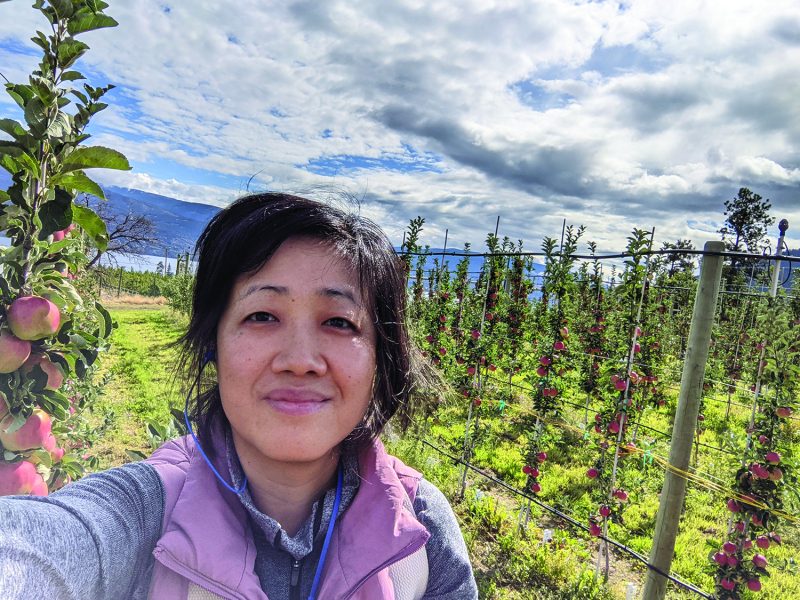Research scientist Hao Xu has always been interested in sustainable agriculture and carbohydrate partitioning, especially in fruit trees.
Following work as a research assistant at the Chinese Academy of Sciences and visiting scholar at the Universidad de Murcia in Spain, Xu studied symbiosis and root water uptake at the University of Alberta. She completed a PhD, majoring in forest biology and sustainable management and was a postdoctoral fellow, studying fungal and plant aquaporins, mycorrhizal symbiosis, plant-water relation and plant stress physiology.
Her work in academia and interest in plant physiology led her to a position with Agriculture and Agri-Food Canada in Summerland in 2017.
Since joining the AAFC team, Xu has conducted research to “investigate tree fruit crop resilience and fruit production in terms of yield and fruit quality under different environmental stressors and different approaches of mitigation,” she says. “Under this umbrella we have been looking at how rootstocks can impact tree resilience, carbohydrate partitioning and fruit production.”
Last year, she investigated the effects of heat on tree fruit quality in the Okanagan Valley. Other projects include looking at irrigation scheduling and how water management impacts fruit quality.
Indeed, one potential long-term mitigation approach to heat stress that she’s found is using larger rootstocks.
“Larger rootstocks … showed promising results last year that they are capable of reducing the ratio of heat damage in fruits per tree, consequently producing more damage-free trees per acre,” Xu says. “The larger rootstocks such as G.935, … we saw an increase in yields. It’s larger than M.9 or M.26 and a lot larger than B.9, which are commonly used rootstocks by growers right now.”
Larger rootstocks contain xylem, which transport water, with larger diameters allowing for higher transport capacity through the grafting union, where the scion and rootstock are united.
“When you supply sufficient water to the trees, the G.935 is able to transport more water,” Xu says. “That provides more transpirational cooling in the canopy and they have a large canopy so there is more foliage density to provide more shading onto the fruits in the canopy. This contributes to a decrease in the counts of sunburn browning on necrotic apples compared to smaller rootstocks.”
However, a downside to larger rootstocks is that they use more water.
“We are trying to sustain production in a very water-limited environment. We need to take that into consideration and do a longer time evaluation on their performance,” Xu says.


 Next policy framework worth $3.5 billion
Next policy framework worth $3.5 billion